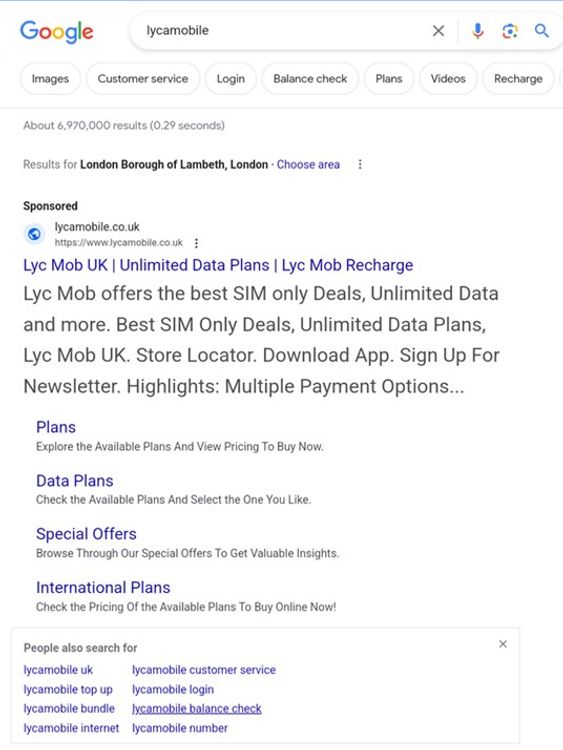A scam website impersonating legitimate phone network Lyca Mobile has found a way to reach the top of Google searches, Which? has warned.
Google allows companies to pay for verified adverts, meaning their sites can feature at the top of relevant searches, but they need to pass an advertiser identity verification process beforehand, which is aimed at weeding out dodgy pages.
But the consumer champion says a scammer mimicking Lyca Mobile has managed to bypass the verification check, allowing them to put a “persuasive” ad at the top of search listings in an attempt to take consumers to a copycat website and steal their card details.
The rogue advertiser got itself verified by Google as “Vodafone Finance Management”, says Which?, claiming to be a subsidiary of Vodafone on Companies House, despite having nothing to do with it.

A screenshot of the dodgy ad at the top of a Google search. Pic: Which?
“Over the course of three days in late January, this verified advertiser was paying Google to appear at the top of results when the public searched for phone network Lyca Mobile,” Which? said.
“You would have had little reason to suspect these adverts at first glance.
“They appeared to link to the genuine web address for Lyca Mobile (lycamobile.co.uk), although the keenest-eyed may have questioned the use of ‘Lyc Mob’ in the blurb.
“Although Vodafone and Lyca Mobile are two separate companies, if you had checked the details of this advertiser, you may have been reassured that it was created by what appeared to be a genuine mobile network.”
This isn’t the first time Which? has highlighted scams taking advantage of Google’s advertiser options.
At the end of 2023, it warned of phoney search engine ads impersonating legitimate parking apps like JustPark and PayByPhone, which it said remained live even after they were reported.
Fake sites are nothing new, but scammers having the ability to bypass Google’s vetting process makes them look more trustworthy, as they come up as being “sponsored” at the top of search pages and users have to click the ellipses next to the link to learn more about the company behind it.
Read more:
Tesla drivers seen using VR headsets
Sat-nav errors keep sending vehicles down Edinburgh steps
In response to the latest scam report, Google said: “Protecting users is our top priority and we have strict ads policies that govern the types of ads and advertisers we allow on our platforms.
“We enforce our policies vigorously, and if we find ads that are in violation we remove them. We continue to invest significant resources to stop bad actors and we are constantly evaluating and updating our policies and improving our technology to keep our users safe.”
A spokesperson for Vodafone told Which?: “Criminals are always looking for new ways to trick companies and consumers, and our ecommerce security teams work hard to stay ahead of them.
“We take fraud extremely seriously and have reported the issue to Google for immediate resolution and to stop this happening again. We also want to clarify that Vodafone UK has no affiliation with Lyca Mobile.”
A spokesperson for Lyca Mobile said: “Unfortunately, this type of scam is all too common. We regularly get website impersonations of our brand closed down, and in this case the scam site in question was taken offline almost as quickly as it appeared.
“But we also have to rely on the platforms we operate on to prevent them occurring in the first place. We welcome moves by Google and others to crack down on this type of activity to protect both consumers and brands from malicious actors.”







